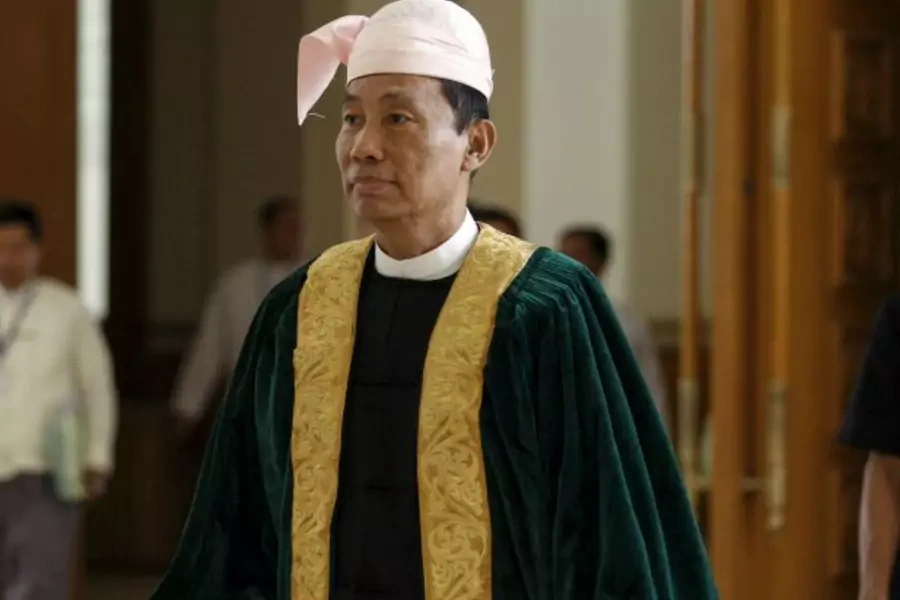More on:
Last week, Union Solidarity and Development Party (USDP) party leader Thura Shwe Mann, the speaker of the lower house of Parliament, was abruptly removed as party chief, only months before Myanmar’s much-awaited national elections. The USDP is the party of President Thein Sein and is currently in control of government, although it is expected to suffer massive losses in the November election, provided the polls are held freely and fairly.
According to multiple reports, late in the night last Wednesday, security forces suddenly surrounded USDP headquarters, stopped some party members from leaving for a time, and may have detained Shwe Mann, at least for several days. (Later in the week, Radio Free Asia reported that Shwe Mann’s son said that his father was not under house arrest.) The party released a statement saying that Shwe Mann was no longer the acting party leader, because he was “too busy” to perform his duties. Myanmar President Thein Sein and former USDP vice chairman Htay Oo will now be leading the USDP into campaign season. On Monday, some reports suggested that Thura Shwe Mann would this week be removed from the party’s seats in Parliament completely.
The fact that Shwe Mann was ousted as party leader is not, in itself, necessarily an ominous sign for Myanmar’s political future. In parliamentary democracies, ambitious members of any party are often scheming to remove party leaders and replace them with allies or themselves. Before the last Australian national election, members of the Labor Party unceremoniously dumped Julia Gilliard as party leader and prime minister, replacing her with Kevin Rudd, who ultimately led Labor to defeat in the election. However, after significant intraparty scheming, the final decision on Gilliard ultimately came in a vote within the caucus for leadership, which she lost to Rudd. A vote---not a midnight scheme involving armed men. What’s more, penultimate leaders of political parties, like presidents, are often trying to silence unruly party members in all sorts of unique---but democratic---ways. The New York Times last week speculated that Israeli Prime Minister Benjamin Netanyahu chose up-and-coming Likud politician Danny Danon to be Israel’s new ambassador to the United Nations in part to temporarily remove Danon from domestic politics. The rising Danon had been an irritant and a potential rival to Netanyahu within the Likud.
It is how the USDP moved out Shwe Mann that is the problem, and that bodes poorly for Myanmar’s transition to democracy. The rank and file of the USDP was not apparently involved in the ouster; even some USDP members of parliament seemed to be caught by surprise, although they must have sense that Shwe Mann’s increasingly warm relationship with Aung San Suu Kyi was not viewed so positively by Thein Sein and his allies. It appears that President Thein Sein and several of his allies in the party’s governing council engineered the ouster with little input from most USDP members. (It is now an open question whether President Thein Sein, who previously said he would not be serving more terms, is open to serving another term as president, potentially as a compromise choice selected by Parliament, since Aung San Suu Kyi cannot be president.) The use of security forces surrounding Shwe Mann also brought back ominous memories of Myanmar’s past, and put another hole in Thein Sein’s image as a reformist leader seeking to oversee a break from the past fifty years of authoritarian rule. And the secrecy and lack of initial clear information about what had happened to Shwe Mann also harkened back to the information void of Myanmar’s authoritarian era; after the purge of Shwe Mann, several Myanmar news outlets known for their favorable coverage of Shwe Mann were suspended by the government.
It is unrealistic to expect that Myanmar, after five decades of military rule, would quickly shed authoritarian political habits. But how each party’s candidates for Parliament and leaders are chosen will play a major role in determining public enthusiasm for the election, and possibly in determining voter turnout as well. Even the National League for Democracy (NLD) has faced criticism from some of it party members for the way in which it has picked its candidates for Parliament. The NLD’s executive committee chose the candidates, and many members of the younger “1988” generation of democracy activists were not selected; some younger NLD supporters argued that the executive committee should have canvassed a wider array of NLD members before deciding who to put up for parliamentary seats.
More on:
 Online Store
Online Store
